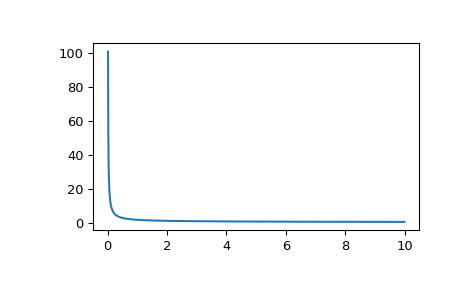scipy.special.k1e#
- scipy.special.k1e(x, out=None) = <ufunc 'k1e'>#
Exponentially scaled modified Bessel function K of order 1
Defined as:
k1e(x) = exp(x) * k1(x)
- Parameters:
- xarray_like
Argument (float)
- outndarray, optional
Optional output array for the function values
- Returns:
- Kscalar or ndarray
Value of the exponentially scaled modified Bessel function K of order 1 at x.
See also
Notes
The range is partitioned into the two intervals [0, 2] and (2, infinity). Chebyshev polynomial expansions are employed in each interval.
This function is a wrapper for the Cephes [1] routine
k1e.References
[1]Cephes Mathematical Functions Library, http://www.netlib.org/cephes/
Examples
Calculate the function at one point:
>>> from scipy.special import k1e >>> k1e(1.) 1.636153486263258
Calculate the function at several points:
>>> import numpy as np >>> k1e(np.array([0.5, 2., 3.])) array([2.73100971, 1.03347685, 0.80656348])
Plot the function from 0 to 10.
>>> import matplotlib.pyplot as plt >>> fig, ax = plt.subplots() >>> x = np.linspace(0., 10., 1000) >>> y = k1e(x) >>> ax.plot(x, y) >>> plt.show()

Exponentially scaled Bessel functions are useful for large arguments for which the unscaled Bessel functions are not precise enough. In the following example
k1returns zero whereask1estill returns a useful floating point number.>>> from scipy.special import k1 >>> k1(1000.), k1e(1000.) (0., 0.03964813081296021)